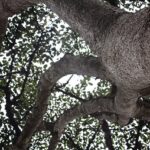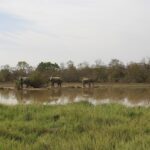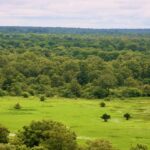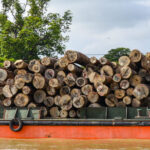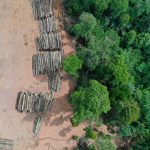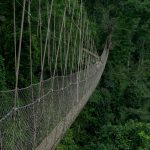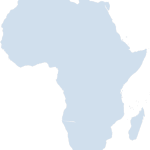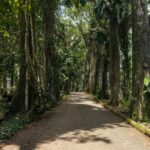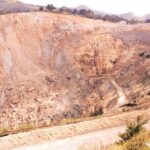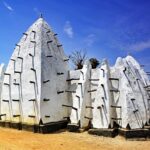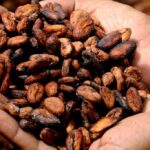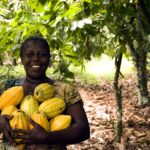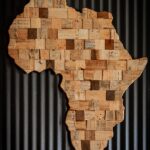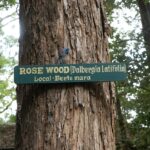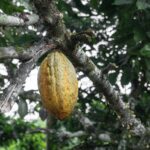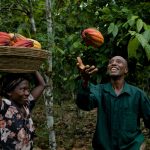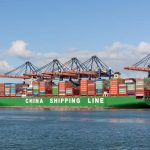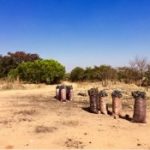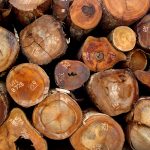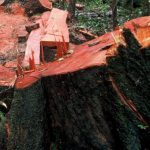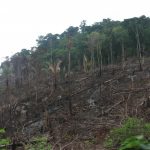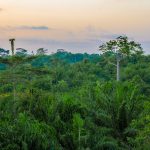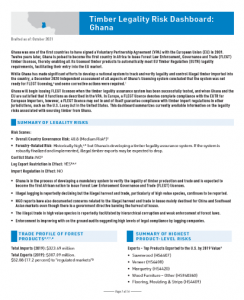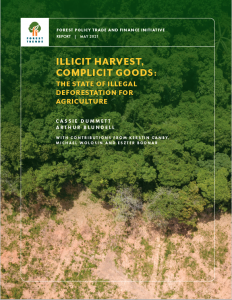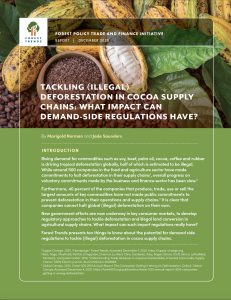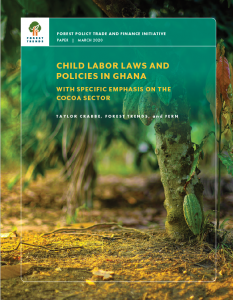
Ghana was one of the first countries to have signed a Voluntary Partnership Agreement (VPA) with the European Union (EU) in 2009. Thirteen years later, Ghana is poised to become the first country in Africa to issue Forest Law Enforcement, Governance and Trade (FLEGT) timber licenses, thereby enabling all its licensed timber products to automatically meet EU Timber Regulation (EUTR) legality requirements, facilitating their entry into the EU market. While Ghana has made significant efforts to develop a national system to track and verify legality and control illegal timber imported into the country, a December 2020 independent assessment of all aspects of Ghana’s licensing system concluded that the system was not ready for FLEGT licensing, and some corrective actions were required.
Ghana will begin issuing FLEGT licenses when the timber legality assurance system has been successfully tested, and when Ghana and the EU are satisfied that it functions as described in the VPA. In Europe, a FLEGT licence denotes complete compliance with the EUTR for European importers, however, a FLEGT licence may not in and of itself guarantee compliance with timber import regulations in other jurisdictions, such as the U.S. Lacey Act in the United States. This dashboard summarizes currently available information on the legality risks associated with sourcing timber from Ghana.
- Ghana is in the process of developing a mandatory system to verify the legality of timber production and trade and is expected to become the first African nation to issue Forest Law Enforcement Governance and Trade (FLEGT) licenses.
- Illegal logging is reportedly declining but the illegal harvest and trade, particularly of high value species, continues to be reported.
- NGO reports have also documented concerns related to the illegal harvest and trade in kosso mainly destined for China and Southeast Asian markets even though there is a government directive banning the harvest of kosso.
- The illegal trade in high value species is reportedly facilitated by hierarchical corruption and weak enforcement of forest laws.
- Enforcement is improving with on the ground audits suggesting high levels of legal compliance by logging companies.
Read more by downloading the Ghana Timber Legality Risk Dashboard here.
Illegal logging and timber trafficking raises economic concerns in Ghana. The country loses an estimated US$200million – US$300million in revenue annually, according to A Rocha Ghana’s 2024 report.
The article highlights issues with reporting discrepancies between Ghana and trade partners, the impacts of US government terminatation of support for ODA in Ghana, and some of the longer term impact of CSO activities.
A short article summarizing the issue of illegal logging, with mention of additional reports.
The Government of Ghana has announced the government’s plan to establish specialized environmental courts to prosecute individuals involved in illegal mining and unauthorized tree felling.
A Ghanain Minister says the first FLEGT licenses will be ready in Summer 2025. He also emphasized key areas for strengthened cooperation, including investments in logistics, capacity building, and technology to aid the deployment of the Wood Tracking System (WTS) and the Ghana Legality Assurance System (GhLAS).
He also urged the EU for assistance in developing large-scale commercial plantations and the Tree for Life Reforestation Initiative.
Additionally, the Minister emphasized other areas that require assistance, such as logistical support in the ongoing fight against illegal mining, land reclamation, restoration of polluted water bodies, and technical aid to modernise the timber industry.
The Bono Regional Minister, Joseph Addae Akwaboah, has urged Muslims to support the fight against the emerging illegal mining activities in the Bono Region.
“The government has introduced strategies to stem the practice, and we are going to prosecute offenders,” he stated, and cautioned the youth to engage in illegal logging and lumbering to stop, as the government does to create jobs for the youth.
The ITTO has released the 2025 scores for its Global Timber Index. The GTI s a survey in nine pilot countries that covers timber harvesting, trade, and manufacturing, including production, orders, imports and exports, employees, inventory, raw material prices, and other business indicators. A GTI index reading above 50 per cent indicates the industry prosperity is generally expanding, while below 50 per cent indicates that it is generally declining.
Other news in the report includes:
- Thailand’s Commerce Ministry announced the simplification of export procedures for the export of Thai wooden products. Except for Siamese Rosewood, which remains banned from export, companies are no longer required to obtain a permit to export these wooden products.
- On sustainable forest management, the report said Brazil’s National Biodiversity Commission established national biodiversity targets for the period 2025-2030, including a target of achieving zero deforestation in the country.
In 2016, Ghana developed a Forestry Development Master Plan aimed at eliminating mining in forest reserves by 2036. This initiative is supported by millions in grants and credits from the World Bank-funded Forest Carbon Partnership Facility and the UN’s global REDD+ fund, as well as a partnership with the EU focused on forest protection and the EU-supported ongoing 20 million Euro ‘Green Project’, all of which are intended to support, among other goals, the efforts outlined in the plan. However, much of this seems wasted as an avalanche of forest mining licenses have recently been allocated to high-profile politicians, including a regional chair of the ruling party and the mayor of Kumasi, Ghana’s second-largest city. When asked about the Forestry Development Master Plan, two responsible officials (see below) professed ignorance of it, with one remarking, “That master plan is from who?”
A ZAM transnational investigation conducted across six African countries has revealed the complicity of governing political elites in rapid deforestation. At the same time, many of these elites are receiving billions of dollars and euros in ‘green’ funds from international partners, including the UN, the EU, and the World Bank. Previous instalments of this investigation, already published by ZAM, have highlighted this pattern in Uganda, Nigeria, and Mozambique. The latest findings from Cameroon, Ghana, and Malawi are in line with the earlier results.
An estimated $200 million is being lost in revenues due to timber trafficking. The forest sector is estimated to bring in 6% of Ghana’s GDP and employ over 200,000 people. Despite efforts to stop illegal activity through Ghana Wood Tracking Systems, the problems continues due to weak law enforcement, the porous nature of the country’s borders, and weak institutional capacities.
Mining is one of the fastest growing causes of deforestation, with a new report published by the World Resources Institue (WRI) revealing that 1.4 million hectares of forests, an area the size of Montenegro, was lost to the extraction of coal, iron and industrial minerals for the 20 years to 2020.Since the turn of the century, mining has increased by 52%. This includes tropical primary rainforests, some of the world’s most important ecosystems where mining is a growing loss driver, and Indigenous and local community territories, where people depend on forests for their livelihoods.
More than 89% of the loss is concentrated in just 11 countries, including Indonesia, Brazil, Russia, the United States, Canada, Peru, Ghana, Suriname, Myanmar, Australia and Guyana.
The Tinte Bepo Forest Reserve, located under the Mankranso Forest Services Division, is currently facing a grave threat from illegal chainsawing activities, particularly along the Bechim to Tepa major road. This article explores the detrimental impact of these activities on plant species and the broader implications for conservation and research.
The coalition of Civil Society Organizations (CSOs) working in the forestry sector, known as Forest Watch Ghana, has raised alarms regarding the state of Ghana’s timber trade and forest resources due to the government’s lack of action on the implementation of the legal framework for legal timber trade.
The warning comes amidst ongoing challenges in enforcing environmental protection laws and illegal activities in the country’s forests.
The Ministry of Lands and Natural Resources, on behalf of the Forestry Commission, has signed a Letter of Intent with the Government of the United Arab Emirates (UAE) for the grant of Thirty Million US dollars ($30,000,000.00) to provide additional/alternative livelihood support to forest fringe communities as an incentive for them to engage in enhanced forest protection, forest restoration and reforestation.
Stakeholders have accused the Forestry Commission of granting licenses to companies to mine in protected areas. However, the CEO of the Forestry Commission has stated that no licenses have been granted in these Globally Significant Biodiversity Areas. He further explained that companies operating in forest reserves are non-gold mining companies and have been operating for a long time. The Forestry Commission has stated it is intensifying efforts to combat illegal mining, including military operations.
Ghana is piloting a system that traces cocoa beans from farm to port as it gears up for a new EU law banning the import of commodities linked to deforestation, a government official said on Thursday. About 60% of the cocoa the country grows is exported to the EU and the industry employs about 17%, opens new tab of Ghana’s working population. Nearly all the farmers growing cocoa in Ghana, the world’s second largest cocoa producer, are smallholders based in remote rural regions who, without government support, might struggle to comply with the law’s requirements.
Ghana’s exports to the European Union (EU) increased by 8% in 2023 reaching Eur2.60 billion from Eur2.40 billion in the previous year while imports from the EU to Ghana fell from Eur3.70 billion in 2022 to Eur3.30 billion in 2023. Ghana’s export trade with the EU is primarily raw materials and semi-processed goods. These include sawnwood, plywood, mouldings, sliced and rotary veneers and boules.
This Fern Op-Ed argues that the traceability requirement at the heart of the E.U.’s new deforestation law can also help lift smallholder farmers around the world out of poverty.
For example, in Côte d’Ivoire, farmers’ organisations say they support the Regulation because it could help push their government to complete the national cocoa traceability system — which they have been demanding for many years, as a means of ridding the local cocoa sector of corruption. This corruption blights the lives of smallholders, who are regularly forced to sell below the government-set price, with multiple local middlemen taking cuts along the way.
A team led by Tanzanian remote-sensing scientist Robert Masolele used high-resolution satellite data and deep-learning techniques to draw up a map identifying the drivers of forest conversion in Africa.
The research shows that most deforested land on the continent is turned into small-scale farms, with the Democratic Republic of Congo and Madagascar being hotspots for this pattern of forest loss.
With better remote-sensing data, researchers can pinpoint where agriculture is eating into forested areas and where cash crops are replacing woodland. In this work, the group focused on commodity crops like cacao, oil palm, rubber and coffee, which are targeted under the European Union’s recently enacted rules to restrict import of crops linked to deforestation.
The Forestry Commission of Chana has disclosed that the fight against small-scale illegal mining (galamsey) is constrained by a lack of Chinese interpreters. Chinese nationals arrested for galamsey are often dismissed due to lack of interpreters. In general, a lack of funding hampers its ability to fight cases of illegal farming, illegal lumbering, illegal mining in court.
Five civil society organizations have signaled their intent to sue the Government of Ghana over its decision to convert protected forests into logging and mining concessions.
Netherlands investors in Ghana, through the Ghana/Netherlands Business and Culture Council (GNBCC), have asked for ‘deepened digitalisation’ in public service to address their exposure to corrupt practices in the sector. “Bureaucratic interference” and firms paying extra costs through “unofficial channels” is considered a problem contributing to the high cost of doing business in Ghana that is discouraging to investors.
UNODC’s 2024 World Wildlife Crime Report has a case study on the illegal trade in rosewood, with a focus on Nigeria. Major players in the case study include China, India, Singapore, Mali, Guinea-Bissau, Brazil, Vietnam and Ghana.
Ghana’s forests are primarily lost to cocoa farming—the country is the world’s second- largest cocoa producer. Illegal logging is another significant cause of deforestation. But the most contentious cause, and one that continues to rile citizens of Africa’s leading gold-producing nation, is illegal small-scale gold mining, locally known as galamsey. Akufo-Addo came to power in 2017 promising to fight the menace, even declaring, “I am prepared to put my presidency on the line on this matter.” In response to intense pressure from local media, he launched an interministerial committee that same year to oversee measures toward sanitizing the small-scale mining sector and putting an end to galamsey.
But under his watch since then, galamsey has instead worsened, with illegal mining now being undertaken in 34 of the country’s 288 forest reserves, even during periods when bans have been in place. Arrests and prosecutions of perpetrators have been selective, with kingpins and financiers left to walk free. Indeed, a leaked report by the chairman of the disbanded interministerial committee alleged that some senior government officials and ruling party officials were actively involved in galamsey with the collaboration of Chinese workers, whom they contracted to undertake operations on mining sites.
The Cocoa Deforestation Risk Assessment (Cocoa DRA) is a map layer that identifies the risk of future deforestation events linked to cocoa in Côte d’Ivoire and Ghana. Cocoa and chocolate companies, as well as other stakeholders in this sector can use this map to identify and prioritize interventions in cocoa supply chains.
The West Africa Cocoa dataset (WAC), a database of mapped cocoa plot boundaries in the direct supply chains of participating companies that provides an extensive view of mapped cocoa production in Côte d’Ivoire and Ghana. The public version of the dataset is available on Global Forest Watch (GFW) as a cocoa plot heat map that further anonymizes data to protect the privacy of farmers and companies.
A new device to track illegal logging from the country’s forests has been deployed in an effort to curb the incidence of illegal exploitation of the timber resources.
When fed with the documentation of the logs, Xylorix Pocket Wood, the App/device, will quickly scan them and give off the information about the woods being carried or conveyed.
198 customs officers, grading and inspection officers at the department of the Timber Industry Development Division (TIDD) and Civil Society Organisations (CSOs) have been trained on the use of the device.
The first high-resolution (5 m) and continental-scale
mapping of land use following deforestation in Africa, including humid and dry forests.
Results show, not surprisingly, that the causes of forest loss vary by region. In general, small-scale cropland is the
dominant driver of forest loss in Africa, with hotspots in Madagascar and DRC. In addition, commodity
crops such as cacao, oil palm, and rubber are the dominant drivers of forest loss in the humid forests of
western and central Africa, forming an “arc of commodity crops” in that region. At the same time, the
hotspots for cashew are found to increasingly dominate in the dry forests of both western and southeastern Africa, while larger hotspots for large-scale croplands were found in Nigeria and Zambia.
Legislation allowing mining in forest reserves challenged A coalition of Civil Society Organisations (CSOs) has petitioned the speaker of Parliament, Alban Sumana Kingsford Bagbin, to annul the Environmental Protection (Mining in Forest Reserves) regulation, Legislative Instrument 2462 (L.I.). The L.I., they argued, allows institutionalised mining in forest reserves without restrictions, casting a shadow on the ecological integrity of the country’s forest resources and commitment to environmental sustainability and conservation. According to the CSOs, the said legislative instrument (L.I. 2462) violates the constitution and other laws that safeguard forests. Also reported in ITTO MIS Jan 1-15 2024 https://www.itto.int/mis/
Guinea’s Minister of Justice has ordered legal proceedings against four government officials over an alleged illegal export of hundreds of containers of critically endangered West African rosewood to China.
The note from Minister Alphonse Charles Wright cites allegations concerning illegal logging, violating timber trade regulations, corrupting public officials, public funds embezzlement and forgery.
The officials appear to have been involved in issuing fake export certificates for at least 377 containers (6,409 metric tonnes) of Pterocarpus erinaceus, or Kosso, a protected rosewood tree native to semi-arid forests of West Africa.
Ghana and Mali are also cited.
Ghana has unlocked new financing support for its climate adaptation and mitigation initiatives at the 2023 International Monetary Fund (IMF)/World Bank Group (WBG) Annual Meetings in Marrakech.
This comes as the World Bank’s International Finance Cooperation (IFC) pledges financing support to Ghana’s implementation of various climate change schemes, to stimulate sustainable growth, a liveable planet, and create more jobs for people.
Activities like deforestation, illegal logging, and unsustainable land-use practices, including illegal mining (galamsey) has led to the depletion of Ghana’s forest cover from the eight million tropical forest in 1900 to the current 2.7 million. This has exposed the country to adverse effects of climate change, resulting in some bush fires, drought, changes in rainfall pattern, rise in sea-level, and the salinity of coastal waters. The government, however, has developed various initiatives, including the Green Ghana Day to encourage Ghanaians to grow more trees to recover lost forest cover.
The world’s largest agriculture producers are pushing back against new European Union rules that require proof that crops weren’t grown on deforested land, which producers say will add to the cost of making food.
Examples and quotes from government and industry players in Brazil, Vietnam, Cote d’Ivoire and Ghana cited.
Cocoa farmers in Ghana are improving yields and mitigating climate change by adopting climate-smart cocoa practices while curbing deforestation.
Ghana has earned $4.8 million for reducing nearly 1 million tons of carbon emissions caused by deforestation and forest degradation—with up to $45 million expected by the end of 2024.
Ghana and other countries are generating high-quality, high-integrity jurisdictional carbon credits to realize their climate goals and gain access to international carbon markets.
The government of Ghana has since 2019 completely banned the export of rosewood from the country to China.
A Ghenvironment.com investigation in April 2023 revealed how rosewood is still harvested and is transported to Tema port.
Also featured at ghenvironment.com
Asantehene Otumfuo Osei Tutu II says he is unhappy with the spate of illegal mining that has ravaged lands in the Amansie area of the Ashanti Region.
“It is very sad that despite the several measures government has been putting in place to curb this menace, illegal logging and illegal mining continue to pose a threat to our forest, which means that government cannot do it alone, we must all get involved and support government.”
“I’m not happy with chiefs in the Amansie area where galamsey has taken over the land, and I say to them that if you sit there and you claim that you don’t know what is happening, then you’re not fit to be a chief over there.”
Justice Camilus Mensah from ‘Hen Mpoano’ (Our Coast) a Non-Governmental Organisation has proposed the setting up of an environmental court to deal with environmental issues such as illegal mining in the county’s forests. Mr. Mensah disclosed this at a two-day workshop organised for police prosecutors and other security agencies on forest and environmental laws. He revealed that the development of laws on illegal logging and mining has been sporadic and ineffective and enforcement has failed mainly because of inadequate budgets and poor training of staff. See: https://newsghana.com.gh/ngo-advocates-the-creation-ofan-environment-court/
Ghana’s widespread illegal mining activities are destroying the gold-rich West African country’s forests, the government’s forestry agency warned Tuesday at a news conference in Accra.
Drawing from Center fro Africa Strategic Stiudies recent report, which is based on recent research and programmatic work at the Africa Center for Strategic Studies, we have analyzed three ways that illegal logging affects national security and what that means for current measures to counter it.
MOLE NATIONAL PARK, Ghana—Mbaaba Kaper stood in the middle of the illegal timber trafficking warehouse where he’d worked as a watchman for nearly six years. Grasping the edge of a graying trunk that reached his shoulders, Kaper said with a smile, “This one is rosewood.”
He was accomplished at identifying rosewood—the world’s most threatened hardwood. Rosewood exports have been banned in Ghana since 2019, but the vast Chinese-run trafficking network in which Kaper worked in Yipala, northern Ghana, was shut down by Ghanaian police only nine months before we visited in June. The immense trees logged during its operation remained on the ground as far as the eye could see.
Some residents of the Savannah Region have expressed worry and disappointment in the traditional authorities and government for allowing commercial charcoal business in the region despite the ban. The canker has resurfaced in the region after a ban was placed on the activities illegal logging, charcoal burning, fuelwood harvesting and small scale mining activities as part of measures geared toward preserving forest reserves as well as prevent economically viable trees from being destroyed.
Illegal chainsaw operators engaged in felling of trees and extraction of natural resources are threatening the landscape and forest reserves of the Western Wildlife Corridor and the Northern Savannah Forest Zone.
Thursday, March 31, 2022 will be recorded in the annals of Ghana’s forestry sector as one of its most remarkable days. On this day, the current Cabinet, at its 26th meeting, approved the conversion of 156 timber concessions and permits into Timber Utilisation Contracts (TUCs), introduced as a major policy reform in the forestry sector to provide for a competitive system of allocating timber resources.
The Forestry Commission, through its surveillance task force, has arrested 55 illegal miners in the Atewa Forest Reserve over the last six months. Madam Joyce Ofori Kwafo, Head, Corporate Affairs and Media Relations, Forestry Commission, in an interview with the Ghana News Agency, said a total of 15 different operations carried out between October 2021 and March 2022 led to the arrest of the culprits.
The Concerned Citizens of Atewa Landscape have called for a full investigation into the negligence and connivance of Forestry Commission staff at the Kyebi District Office in protecting the Atewa Forest. The Group, at a press conference, said illegal activities in the Atewa Forest had escalated in the past six months without any measures to protect and preserve the forest and its biodiversity.
Ghana has for years remained a key exporter of timber. However, stakeholders have been struggling to deal with illegal felling of trees, which made timber exports from Ghana fall short of the European Union’s guidelines. In a bid to address the worrying situation and also improve revenue mobilization, the Ministry of Lands and Natural Resources and the Forestry Commission have launched the digitalized property mark registration and renewal process and the Ghana electronic wood tracking system.
The Chief Executive of the Forestry Commission has described illegal logging in forest reserves as a national security issue that calls for a holistic approach. John Allotey says the rampant issue, especially in Bono, Ahafo, and Western North corridors, threaten rich forest reserves and commission staff, especially forest guards.
Click here to access the Global Illegal Logging and Associated Trade (ILAT) Risk assessment tool and to download the Forest Trends User Guide describing the functionality of the ILAT Risk Data Tool.
Click here to access the Cattle Data Tool.

